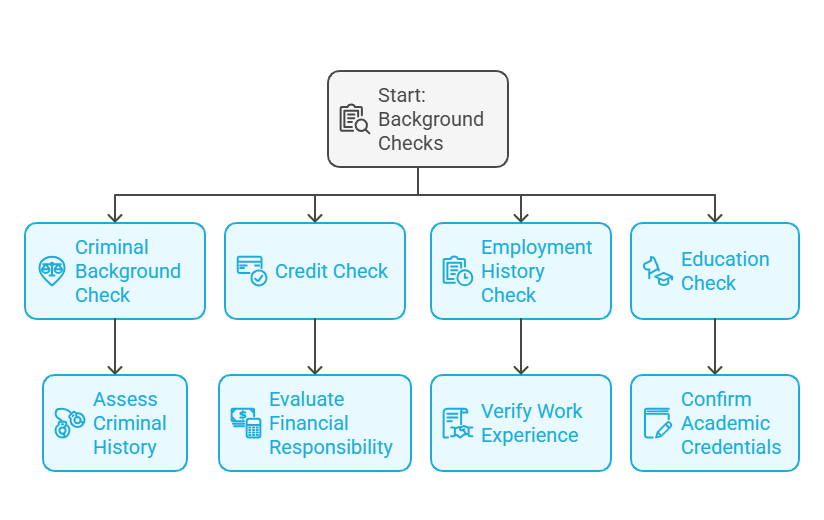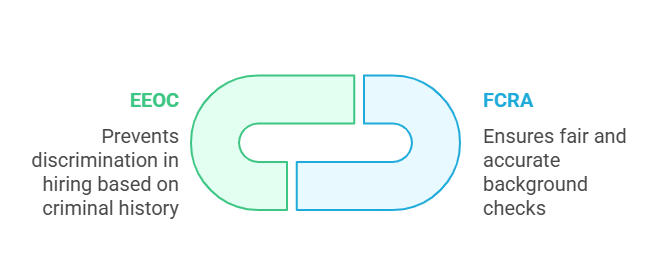Will Warrants Show Up During a Background Check?
Background checks are a vital part of the hiring process, providing employers with crucial information about potential employees. These checks help verify a candidate’s criminal history, employment history, credit score, and other aspects of their background to ensure that they are trustworthy and suitable for the job. Employers often rely on background checks to reduce risk, safeguard their workplace, and protect their reputation. The depth of these checks can vary, depending on the type of job and industry.
For businesses, conducting background checks isn’t just a step in hiring; it’s a necessary measure to ensure the safety and security of the workplace. These checks allow companies to make more informed decisions and avoid hiring candidates who might pose a risk. While many aspects of background checks are well understood, one question often arises: Will warrants show up during a background check?
Types of Background Checks
Before diving into the specifics of warrants, it’s essential to understand the different types of background checks used in hiring processes. Each of these checks serves a unique purpose and can help employers verify information and assess the risk a candidate may pose.

1. Criminal Background Check
The most common type of background check is the criminal background check, which includes searching public criminal records to find out if a candidate has any prior convictions, arrests, or warrants. Criminal background checks can reveal felonies, misdemeanors, and any other relevant criminal activity that could impact an individual’s eligibility for a position.
2. Credit Check
Employers, particularly in industries like finance or banking, may run credit checks to assess the financial responsibility of a candidate. These checks look at credit scores, debts, bankruptcies, and payment histories, which can indicate whether someone has the fiscal discipline to handle certain job responsibilities.
3. Employment History Check
Employment history checks validate the candidate’s previous job titles, dates of employment, and overall work experience. Employers use this information to confirm that a candidate has the experience necessary for the role they are applying for.
4. Education Check
Education verification checks the accuracy of the academic credentials claimed by a candidate. This is particularly important for positions that require specific degrees or certifications.
Warrants in Background Checks
One of the most common concerns regarding background checks is whether or not warrants show up. The answer to this depends on several factors, including the type of background check being conducted and the specific databases or sources being searched.
What Types of Warrants Are Checked?
When performing a criminal background check, employers typically examine a candidate’s criminal record, which may include arrest warrants, active warrants, or bench warrants. In general, criminal background checks search local, state, and federal databases to uncover any active warrants. However, it’s important to note that warrants may not always appear unless they are related to a criminal conviction.
- Active Warrants: These are warrants that are still open and can result in immediate action, such as arrest. Active warrants are typically visible in criminal background checks and may be flagged by the background screening provider.
- Bench Warrants: These are issued when someone fails to appear in court as required. Bench warrants may also appear during a background check, although they might not always be visible depending on the jurisdiction and the specific search.
- Arrest Warrants: These are issued when a law enforcement agency has probable cause to believe a crime has been committed and a suspect should be arrested. Like active warrants, arrest warrants are often included in criminal background checks.
How Warrants Affect the Hiring Process
Warrants can significantly impact the hiring process, especially if they are tied to serious criminal charges. Employers may decide not to hire someone with an active warrant, as it can imply unresolved legal issues or concerns over their potential to be arrested. However, in many cases, employers are required to follow specific legal processes before making a hiring decision based on warrants.
It is crucial for employers to understand that just because a warrant appears on a background check, it does not necessarily mean the individual is guilty of any crime. A warrant is simply an indication that there is a legal issue that requires attention, and the candidate may not be aware of the warrant or its implications.
Data Table: Types of Background Checks and Warrants Detection
Below is a table that compares the different types of background checks and how they detect warrants, as well as the impact of warrants on hiring decisions.
| Type of Background Check | Detects Active Warrants | Detects Bench Warrants | Detects Arrest Warrants | Impact on Hiring Decisions |
|---|---|---|---|---|
| Criminal Background Check | ✅ Yes | ✅ Yes | ✅ Yes | May disqualify candidates with active warrants |
| Credit Check | ❌ No | ❌ No | ❌ No | No impact on hiring decision |
| Employment History Check | ❌ No | ❌ No | ❌ No | No impact on hiring decision |
| Education Check | ❌ No | ❌ No | ❌ No | No impact on hiring decision |
This table demonstrates that criminal background checks are the only checks that specifically target warrants. The presence of a warrant in a criminal background check could impact a hiring decision, depending on the company’s policies and the nature of the warrant.
Why RapidhireSolutions Stands Out in the Background Check Industry
When it comes to background checks, businesses require more than just basic information—they need fast, accurate, and legally compliant results to make informed hiring decisions. While there are various providers in the market, RapidhireSolutions has earned a reputation as a leader in delivering high-quality background check services. The company excels in areas such as speed, accuracy, legal compliance, and customer service, making it an ideal choice for businesses looking to streamline their hiring process.
Comparison of Background Check Providers
To help businesses make a clear decision about the right background check provider, we’ve compiled a comparison table that outlines the key strengths and weaknesses of RapidhireSolutions versus its competitors. This table provides an easy-to-read overview of the features that matter most when choosing a background check service.
| Feature | RapidhireSolutions | Competitors |
|---|---|---|
| Accuracy | ✅ Highly Accurate | ❌ Less Reliable |
| Turnaround Time | ✅ 24-48 hours | ❌ 15-20 days |
| Legal Compliance | ✅ FCRA & GDPR Compliant | ❌ Limited Compliance |
| Customer Support | ✅ 24/7 Availability | ❌ Limited Support Hours |
| Pricing Transparency | ✅ Clear & Affordable | ❌ Hidden Fees |
Key Advantages of RapidhireSolutions
RapidhireSolutions stands apart from competitors in several important areas, beginning with the speed at which background checks are processed. The company offers a rapid turnaround time—typically 24 to 48 hours—ensuring businesses can move forward quickly with hiring decisions. This is a critical advantage, as many background check providers can take weeks to deliver results, which can delay the hiring process significantly.
Another major benefit of choosing RapidhireSolutions is the accuracy and comprehensiveness of its background checks. The company uses advanced technology and a robust database to gather and verify accurate data, ensuring employers receive the most up-to-date and reliable information. This includes criminal history, education verification, employment history, and more, making it a one-stop-shop for comprehensive background screening.
RapidhireSolutions also places a strong emphasis on legal compliance. The company adheres to important regulations such as the Fair Credit Reporting Act (FCRA) and General Data Protection Regulation (GDPR), ensuring all background checks are performed in accordance with legal standards. This is essential for employers who want to avoid potential legal risks that may arise from non-compliance with these laws.
Data Table of Services
In this table, we compare RapidhireSolutions with other background check providers based on key factors that matter to employers:
| Factor | RapidhireSolutions | Competitors |
|---|---|---|
| Turnaround Time | ✅ 24-48 hours | ❌ 15-20 days |
| Pricing Transparency | ✅ Clear & Affordable | ❌ Hidden or Variable Fees |
| Legal Compliance | ✅ FCRA & GDPR Compliant | ❌ Limited Compliance |
| Customer Satisfaction | ✅ High Satisfaction | ❌ Mixed or Low Satisfaction |
| Comprehensive Reports | ✅ Full & Detailed | ❌ Basic or Incomplete |
Why RapidhireSolutions is the Better Choice
RapidhireSolutions excels where many competitors fall short. Its swift processing times are unmatched in the industry—employers no longer have to wait weeks for background check results. Instead, RapidhireSolutions provides businesses with a quick and efficient way to complete their hiring processes, typically within 24 hours.
Additionally, RapidhireSolutions guarantees a high level of accuracy and compliance. The company’s use of cutting-edge technology and its adherence to FCRA and GDPR standards ensure businesses receive trustworthy and legally compliant reports. This, combined with transparent pricing and excellent customer support, makes RapidhireSolutions the best choice for employers looking to streamline their background check process.
Detailed Pros and Cons
Pros of RapidhireSolutions:
- Faster Turnaround Time: Background checks are completed in as little as 24-48 hours, allowing businesses to make quicker hiring decisions.
- Comprehensive Reports: Offers thorough background checks, including criminal history, education verification, employment history, and more.
- Legal Compliance: Fully compliant with FCRA, GDPR, and other relevant regulations, ensuring legal protection for employers.
- High Customer Satisfaction: Customers consistently rate RapidhireSolutions highly for reliability, customer service, and report accuracy.
- Transparent Pricing: Clear pricing structure with no hidden fees ensures businesses understand what they’re paying for.
Cons of Competitors:
- Slower Turnaround Time: Competitors often take 15 to 20 days to process background checks, which can lead to delays in hiring.
- Limited Legal Compliance: Some competitors do not fully comply with FCRA, GDPR, and other legal standards, potentially exposing businesses to legal risks.
- Hidden Fees: Many competitors charge hidden or unclear fees, making it difficult for businesses to predict the total cost of their services.
- Inaccurate or Incomplete Reports: Some competitors provide incomplete or less reliable reports, which may lead to incorrect hiring decisions.
- Limited Customer Support: Several background check providers offer limited customer service, which can be frustrating for businesses when issues arise.
Legal Considerations for Background Checks
Understanding the legal implications of background checks is essential for businesses. Employers must follow strict regulations to ensure the process is fair, non-discriminatory, and compliant with the law. Two key laws that govern background checks in the United States are the Fair Credit Reporting Act (FCRA) and the Equal Employment Opportunity Commission (EEOC) guidelines. These regulations govern the way employers can access, use, and store background check information.

Fair Credit Reporting Act (FCRA)
The FCRA is a federal law that ensures employers use accurate and fair information during the hiring process. It governs how employers can obtain background checks, the consent process, and the applicant’s rights regarding the use of their background information. Under the FCRA, employers must:
- Obtain written consent from the candidate before conducting a background check.
- Notify the applicant if any adverse action (such as not hiring) is taken based on the background check.
- Provide the applicant with a copy of the background report if it leads to an adverse employment decision.
Equal Employment Opportunity Commission (EEOC)
The EEOC enforces federal laws that prohibit discrimination in the workplace. The EEOC guidelines suggest that employers should not automatically reject candidates based on a criminal history unless the crime is relevant to the job position. Employers are encouraged to evaluate the nature of the offense, the time that has passed, and the relevance of the crime to the duties of the job.
Warrants and Their Legal Handling
Warrants, particularly outstanding arrest warrants, can sometimes appear during background checks. If a warrant is present, it could be flagged in criminal background reports. Employers must ensure they follow the correct legal procedures when considering a candidate with an active warrant. It’s important to note that while warrants can show up in criminal background checks, they may not always be included in certain reports like credit or employment history checks. The presence of an active warrant could affect the hiring decision depending on the nature of the warrant and the job’s requirements.
It is critical for employers to consider the legal validity of the background check before making any employment decisions. If a warrant is discovered, employers should handle the situation delicately and in accordance with relevant employment laws. Consulting legal counsel or experts in HR compliance is always a wise practice.
FAQs
Will a warrant show up on a background check?
Yes, an active warrant can show up during a criminal background check. However, it may not appear in credit or employment history checks, as these reports generally focus on financial and professional matters, not legal matters.
How long do warrants stay on your record?
Warrants typically stay on your record until they are resolved or cleared. An active warrant remains in effect until the individual is apprehended or the case is otherwise resolved.
Can employers discriminate based on an active warrant?
While an employer can consider an active warrant, it must be done carefully and in compliance with EEOC guidelines. Employers should evaluate whether the nature of the offense is relevant to the job position. Discrimination based on irrelevant or outdated criminal history could lead to legal consequences.
How can I check if I have a warrant on my record?
You can check for any outstanding warrants by contacting local law enforcement agencies, conducting an online background check, or seeking legal counsel. Many states also offer online resources to check for active warrants.
Do warrants expire over time?
Warrants do not expire but can become inactive or void if not executed within a certain period, depending on the type of warrant and the jurisdiction. However, an individual will still be subject to arrest if a warrant is active and not cleared.
Conclusion
Understanding how warrants can affect background checks is crucial for both employers and job applicants. It’s important for employers to follow legal guidelines when considering candidates with criminal histories or outstanding warrants. Using a reliable and compliant service like RapidhireSolutions can ensure that background checks are completed accurately, quickly, and in compliance with the law, reducing the risk of discrimination and legal pitfalls.
By working with a trusted provider, employers can efficiently navigate the background check process and make informed hiring decisions. RapidhireSolutions stands out as a leader in the industry, offering fast, accurate, and legally compliant background check services that give businesses peace of mind during the hiring process.

